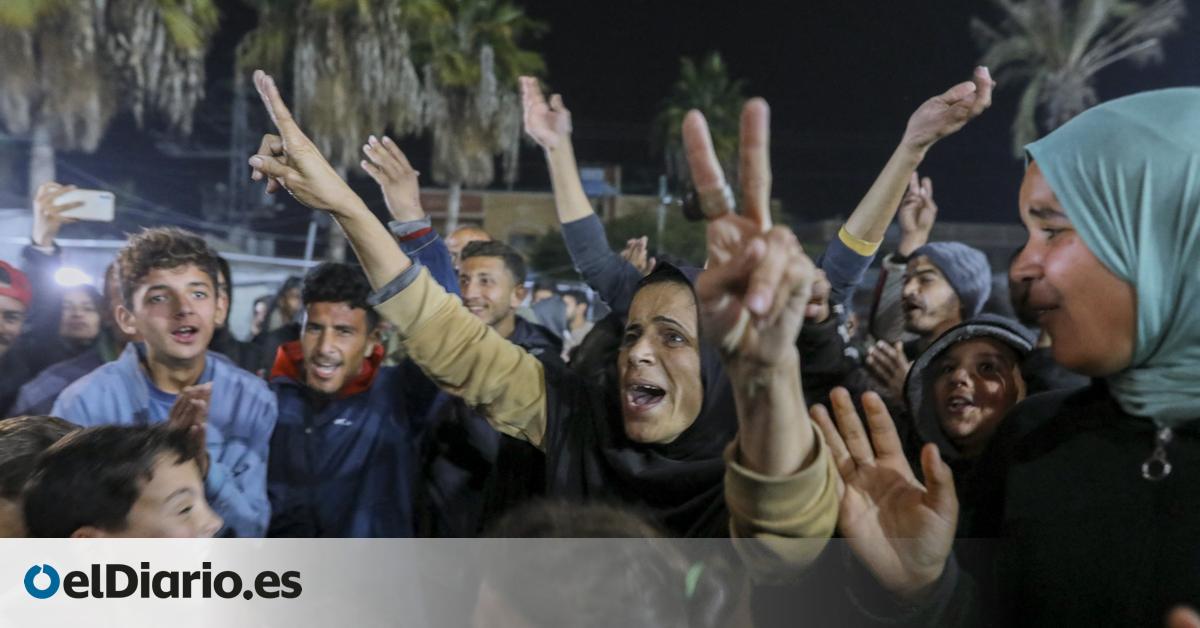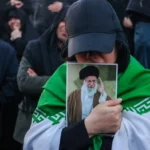
Standing on his shoulders, with the Palestinian flag around his neck, a darbuka (percussion instrument) and illuminated by the flashes of his compatriots’ cell phones, a young Gazan celebrates the ceasefire agreement in Khan Yunis surrounded by dozens of people walking around the streets of the city singing with joy.
After five weeks of high-level negotiations in Qatar, Israel and Hamas have reached a phased ceasefire agreement that now begins a fragile and delicate implementation process. In 15 months of punishment war with more than 46,500 Palestinian deaths and the Gaza Strip devastated, there have only been seven days of relative silence after a brief ceasefire agreement reached in November 2023 that collapsed on the eighth day. Despite the announcement of the ceasefire, this morning at least 50 Gazans have died due to Israeli attacks.
The current text, which will be put to a vote in the Israeli Government this Thursday to give the final yes, will come into force this Sunday. In a first phase, which will last 42 days, Hamas will release 33 hostages and Israeli troops will progressively withdraw from the populated centers of Gaza. Israel will also allow the return of unarmed Gazans to the north of the Strip and will release an undetermined number of Palestinian prisoners. After the first 15 days, the parties will begin negotiations for a second and third phase whose ultimate objective is a permanent ceasefire, the Israeli withdrawal from the Strip and that Hamas does not enter Israeli territory again, as confirmed by the secretary of US State, Antony Blinken.
“The first phase will lead to the start of negotiations for the next. That can be difficult and we could potentially end up in the same situation as in November 2023, when the ceasefire was not extended,” Jørgen Jensehaugen, senior researcher at the Peace Research Institute of Oslo (PRIO) and specialized in the conflict. “Implementation is always a challenge and things can fall apart during this phase,” he adds.
Xavier Abu Eid, political scientist and former advisor to the Palestinian negotiating team, tells this newspaper that “the most important thing is implementation.” “Let us remember that Israel is not a country known for implementing the agreements it signs. He did not do it with Lebanon, he did not implement the Oslo Agreement… What is relevant here is the role of the countries guarantors of the agreement: Qatar, Egypt and the United States. There we will really see what the role of the Trump Administration will be in making this agreement continue,” he says. “These are very tense moments, but there is some peace of mind that the massacres of innocent civilians are going to stop for now.”
In this sense, the Qatari Prime Minister, Mohammed bin Abdulrahman Al Thani, one of the main mediators, was more optimistic than with the November 2023 agreement. “So it was to create the momentum to reach a longer agreement, which is what we have today. “Unfortunately, the November agreement was very transactional and day-to-day, but this agreement has a clear mechanism for the first 42 days and a clear mechanism for negotiating the second and third phase.” The three guarantor countries will establish a team in Egypt in charge of monitoring implementation and compliance throughout the entire process.

Another concern among experts is the price of this agreement to obtain Israel’s approval, since similar drafts have been rejected by Tel Aviv in recent months. “I am concerned about the price of this agreement and if it means that the US will give Israel the green light for the annexation of the West Bank,” says Sonia Boulos, a Palestinian-Israeli professor at the Antonio de Nebrija University and an expert in international law. “We already saw what France did for the agreement in Lebanon, declaring that Netanyahu has immunity [ante la Corte Penal Internacional].
“I am also concerned about international accountability efforts and that states are now less interested in collaborating in this regard,” adds Boulos.
Abu Eid agrees: “There is a real possibility that internal commitment [con la extrema derecha] “Israel is to annex at least part of the occupied West Bank in exchange for a ceasefire.” The far-right members of Netanyahu’s Government oppose the ceasefire and have been trying to stop any agreement for months, even threatening to resign.
Regarding annexation, in recent weeks the approval process for the creation of new settlements has changed and been streamlined. The NGO Peace Now maintains that the authorities want to build 2,749 new homes in the occupied West Bank in just six weeks.
“I am glad that this time national and security considerations have prevailed over political interest and have supported the government to make the correct decision from an ethical, political and moral point of view,” Yoav Gallant, former Minister of Defense, published in X. of Netanyahu dismissed for his differences with Netanyahu.
For Raji Sourani, a Gazan lawyer and director of the Palestinian Center for Human Rights, this agreement is special and a symbol of the resistance of his people. He was nearly killed by Israeli bombs on several occasions, fled the Strip and is now eager to return. “We all need this ceasefire. As a Palestinian, we want to stop the genocide, the daily mass killing, the destruction, the displacement and the famine. After 15 months, the Israeli occupation has achieved none of its objectives.”
“Israel has not achieved absolute victory and we do not give up. There is no political horizon that will end the conflict, but the Israelis and Americans have realized that we are the stones of the valley and no power on earth can make us leave,” Sourani says of the prospects for long-term peace. .
The lawyer, who was one of the promoters of the case at the International Criminal Court and who is part of South Africa’s legal team in the genocide lawsuit at the International Court of Justice, adds: “The legal fronts will not stop. We must continue towards accountability for criminals. Peace should not contradict justice, which is the guarantee that genocide is not repeated again.”
Two months ago, Qatar announced its withdrawal as a mediator due to the lack of “will” and “seriousness” of the parties and denounced that the negotiations were being used to “prolong the war.” Trump had just won the elections, Netanyahu had expelled his Defense Minister and the deadline for a US ultimatum to Israel had been met without success.
That statement began to move the needle and Donald Trump pressed for an agreement before his inauguration and issued a threat: “Hell will break out in the Middle East” if the hostages do not return when he takes office. The president-elect even sent his Middle East envoy, Steve Witkoff, to meet with Netanyahu and the Qatari prime minister at the end of November. Negotiations officially resumed in early December and five weeks later, the parties have reached an agreement.
The prime minister has indicated that progress in the negotiations has occurred thanks to the joint work of both Trump’s special envoy for the Middle East, Steve Witkoff, and the current White House Middle East coordinator, Brett McGurk. “We have seen a favorable moment in the last month,” said the prime minister. “The steps that have been taken lately in the US have led to this moment.” President Joe Biden has assured that the agreement is built on the basis of his proposal presented in May.
UN agencies and NGOs insist that one of the first priorities now is for Israel to allow in sufficient humanitarian assistance. “There is no time to waste. Israel’s continued and deliberate denial and obstruction of humanitarian aid to Gaza has resulted in civilians facing unprecedented levels of hunger and children dying of starvation. “The international community, which has so far shamefully failed to persuade Israel to comply with its legal obligations, must ensure that Israel immediately allows vital supplies to urgently reach all parts of the Gaza Strip,” the statement said. Secretary General of Amnesty International, Agnès Callamard.
“Unless Israel’s illegal blockade of Gaza is lifted without delay, this suffering will only continue. “For the Palestinians, who have lost so much, there is not much to celebrate when there are no guarantees that they will obtain justice and reparation for the horrible crimes they have suffered,” he added.
But in the meantime, “people will continue to die tonight,” recalled an Al Jazeera journalist in Gaza in a live broadcast minutes after the agreement was announced.
Source: www.eldiario.es

